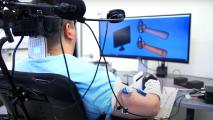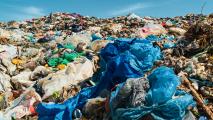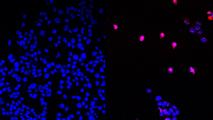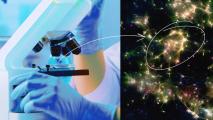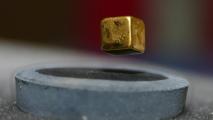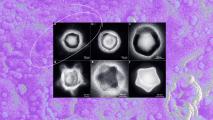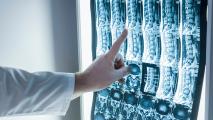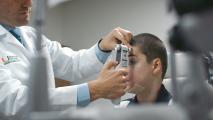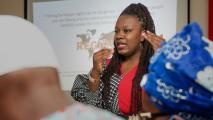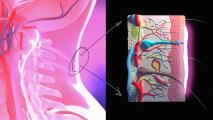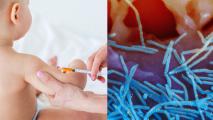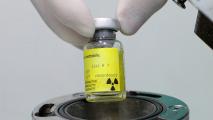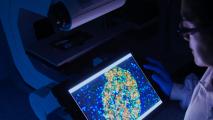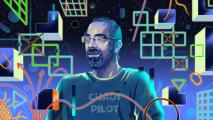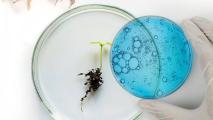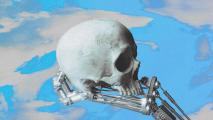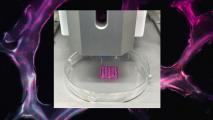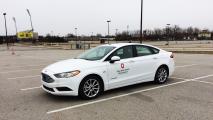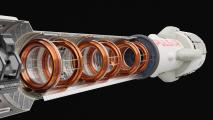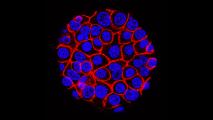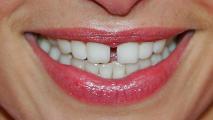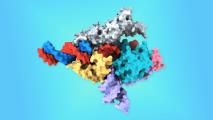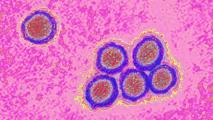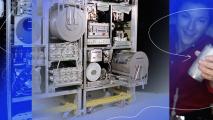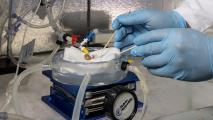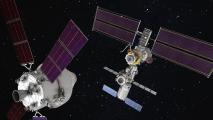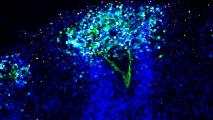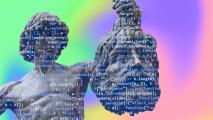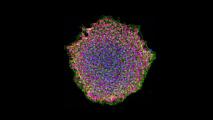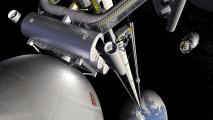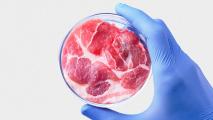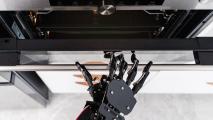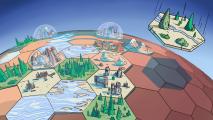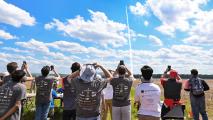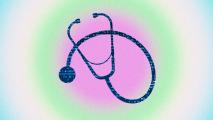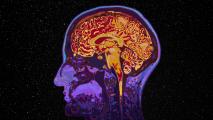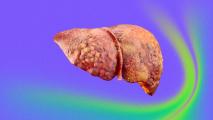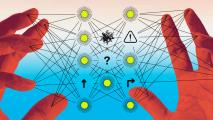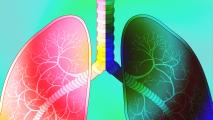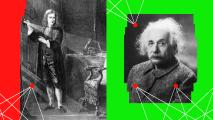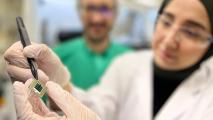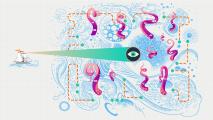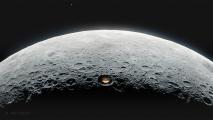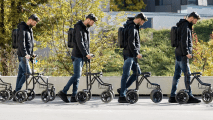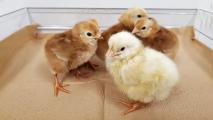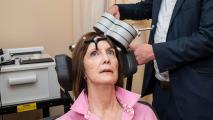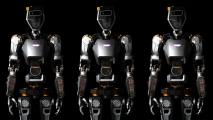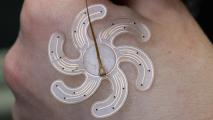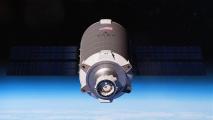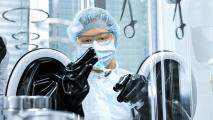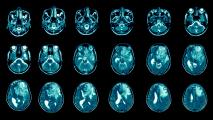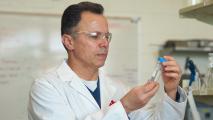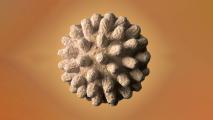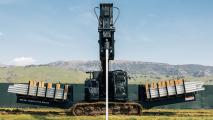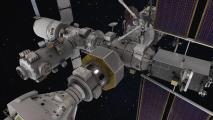Status: Featured
To promote content in various display modules across the site
AI now lets you have real conversations with NPCs in video games
Future video games could feature a near-infinite number of possible storylines.
AI-powered brain implant restores feeling, movement in man with paralysis
A first-of-its-kind AI-powered brain implant has restored movement and feeling in a New York man with quadriplegia since 2020.
Our planet is swimming in plastic. Here’s how we fix that
In partnership with McNulty Foundation
You’ve probably heard about the microplastic problem. But it’s not hopeless — this organization is cleaning up rivers.
Targeted therapy kills every type of cancer in the lab
City of Hope researchers are trialing a targeted therapy shown to kill more than 70 types of cancer in preclinical tests.
Australian military is funding a computer chip merged with human brain cells
The Australian military is funding research into "organoid intelligence" that involves stimulating lab-grown mini-brains with electrodes.
Ask Ethan: Is LK-99 the holy grail of superconductors?
The holy grail of superconductor science is to find a superconductor at room temperature and standard pressure conditions. Is LK-99 the first?
This non-profit is helping 1st gen college students out-earn their parents
In partnership with McNulty Foundation
75% of their students out-earn their parents. How Braven is restoring the American dream.
These giant viruses are unlike any we’ve ever seen before
Scientists have discovered a variety of “giant viruses” unlike any ever seen before in Massachusetts’ Harvard Forest
These Zimbabwean grandmothers are bringing mental health support to their community
In partnership with McNulty Foundation
Therapy from grandmothers is 86% effective in improving mental health. Here’s the organization looking to bring that model to the rest of the world.
A $790,000 flying car is now cleared for takeoff
Air mobility startup Aska has begun flight testing the Aska A5, an SUV-sized flying car that costs an eye-watering $789,000.
AI will soon tell doctors how to predict your future health
A new AI can can analyze X-rays for a important predictor of heart disease with a high degree of accuracy.
Two CRISPR treatments for Alzheimer’s ace early studies
Two teams of researchers have used CRISPR to alter the genes of mice to alleviate signs of Alzheimer’s disease.
Google-backed startup sets two world records in geothermal power
Google-backed startup Fervo Energy has successfully tested a record-breaking enhanced geothermal system in Nevada.
First-of-their-kind eye drops reverse blindness in teen
A topical gene therapy designed to heal the wounds of people with “butterfly skin disease” has now been used to reverse blindness.
How Big Tech breeds disinformation — and how we take back truth
In partnership with Skoll Foundation
Big Tech, big responsibilities. Here’s how keeping tech companies accountable can stop the spread of misinformation, and even save lives.
New clinical trial is testing a ketamine skin cream for PTSD
A topical ketamine treatment designed to alleviate the symptoms of PTSD without causing hallucinations has entered clinical trials.
New RSV shot protects babies against dangerous lung infections
The FDA has approved nirsevimab, an RSV shot that protects babies against the leading cause of infant hospitalizations in the US.
Apple has reportedly built its own ChatGPT
Apple is reportedly exploring the potential of generative AI, but hasn't decided how to incorporate the tech into its products yet.
Radioactive drugs are transforming cancer treatment
Radiopharmaceuticals allow doctors to directly target patients' cancer cells and avoid healthy tissue typically damaged by radiation therapy.
Startup aims to transplant pig hearts into kids in 2024
eGenesis hopes to transplant pig hearts from genetically engineered swine into young children with serious heart defects by 2024.
Innovation chief says “pressure test” your pet hypothesis. It’s guaranteed to be wrong.
His grandfather, a member of Oppenheimer’s atomic bomb team, foresaw the potential of nuclear energy to power cities – not destroy them. Today, Astro Teller is on a mission to harness innovation for good. Here’s how he’s doing it.
Lab-grown cotton is on its way to consumers
Cellular agriculture startup Galy has signed a deal that will make its lab-grown cotton available to consumers for the first time.
Will AI kill humanity by 2100? “Superforecasters” and experts disagree on the odds
AI was the most divisive topic in a recent predictions tournament.
Natural killer cells now have a better shot at destroying cancer
A 3D-printing-based approach could make immunotherapies based on natural killer (NK) cells better equipped to destroy cancer.
VR for self-driving cars makes training safer, more efficient
A system that acts like a virtual reality headset for self-driving cars makes training the vehicles safer and more efficient.
A functional cure for brittle diabetes is now available in the US
Islet transplantation, a procedure shown to functionally cure some people with hard-to-control brittle diabetes, has been approved in the US.
A fusion rocket designed to travel 500,000 mph is under construction
British startup Puslar Fusion is developing a fusion rocket it says will travel 500,000 mph, expanding our reach throughout the solar system.
New AI predicts who is most at risk of pancreatic cancer
An AI that identifies patients most at risk of pancreatic cancer could lead to earlier diagnosis of the deadly disease.
Drug to grow new teeth heads to human trials
A drug that causes animals to grow new teeth could one day allow us to regenerate teeth lost to injury, disease, or old age.
MIT’s vaccine-enhanced CAR-T cell therapy destroys solid tumors
Adding a cancer vaccine to CAR-T cell therapy, a revolutionary treatment for blood cancers, boosts its efficacy against solid tumors.
The US just certified its first fully electric flying car
Alef Aeronautics' Armada Model Zero is the first fully electric flying car to secure a certificate of airworthiness from the FAA.
“Zombie” cells are the key to a tiny sea creature’s full-body regeneration
A tiny sea creature’s regenerative abilities add to the growing evidence that senescent cells aren’t always detrimental.
One shot of the klotho protein boosted memory in old monkeys
A single shot of klotho, a protein linked to longevity, improved the working memory of older rhesus macaques.
First CRISPR-like system discovered in animals
A CRISPR-like gene-editing system found in animals and other complex organisms has been used to edit human cells for the first time.
New meningitis vaccine is the first to cover new emerging strain
A new meningitis vaccine that protects against five bacterial strains outperformed an existing shot in a phase 3 trial.
Military vet’s lightweight mask is protecting soldiers from toxic fumes
A Canadian military veteran's innovative mask is protecting soldiers, police, and first responders from toxic exposure.
Newly identified type of depression affects 27% of patients
Stanford University researchers have identified a new, hard-to-treat type of depression characterized by problems with cognition.
NASA now recycles 98% of astronauts’ urine and sweat
A new water recycling system on the ISS can recover a record-breaking 98% of the water used by astronauts.
Cryogenically frozen organs successfully transplanted into rats for the first time
Thanks to a new "nanowarming" technique, scientists have successfully transplanted cryogenically frozen organs into rats for the first time.
NASA’s ChatGPT-like AI will let spaceships talk to astronauts
NASA is developing a ChatGPT-style interface for spacecraft, giving astronauts the ability to talk to the machines using natural language.
A simple tweak could improve treatment of a deadly herpes brain infection
Anti-inflammatory drugs could potentially prevent herpes encephalitis from causing permanent brain damage.
GPT AI will help teach the most popular course in the world
A Harvard professor is developing a GPT-based chatbot to help teach CS50, the most popular online course in the world.
Open-source “Davids” are taking on GPT-4 and other Goliaths
Powerful tech companies keep LLMs like GPT-4 shrouded in secrecy. But a new wave of open-source LLMs is giving the power of chatbots to the people.
AI predicts hit songs based on listeners’ heartbeats
A new AI predicts hit songs with 97% accuracy based on how a person’s heart beats while listening to the track.
One shot epilepsy treatment reduced seizures by 95% in first two patients
A stem cell-based treatment for epilepsy slashed the number of seizures experienced by two trial participants by 95%.
Space elevators are inching closer to reality
Tremendous progress has been made developing the materials necessary for a space elevator — but our need for one could soon disappear.
Lab-grown meat is finally approved in the US. Here’s how you can get some.
Two startups from California have received regulatory permission to begin selling lab-grown chicken in the US.
These robots learn how to do chores from watching videos
A new method for training robots could help streamline the ways researchers teach robots to perform simple tasks.
California will begin backing intentional burns to control wildfire
After decades of suppression, California is now supporting prescribed burns and cultural burns.
Toyota claims it will double the range of EVs in less than 3 years
Toyota’s been a bit behind the EV game, but claims game-changing batteries and new EV models are on the way.
Insulin grown in lettuce can be taken orally
New synthetic insulin harvested from lettuce plants can be made cheaply, taken orally, and transported at room temperature.
NASA shares colorful “postcard” of Mars’ surface
NASA has used photos taken by the Curiosity rover to create a gorgeous “postcard” of the Martian landscape.
Cancer med appears to prevent brain aneurysms
Japanese researchers have discovered that the cancer drug sunitinib can prevent the formation of brain aneurysms in mice.
3D-printed “superalloy” could make power plants more efficient
The material is both stronger and lighter than those used to make conventional turbines.
Can “terraforming” turn Mars or the moon into Earth 2.0?
Terraforming — the hypothetical process of making another place “Earth-like” — offers the hope of turning Mars or the moon into Earth 2.0.
GitHub CEO says Copilot will write 80% of code "sooner than later"
GitHub CEO Thomas Dohmke goes in depth to answer questions about how AI-powered development will change the future of innovation itself.
Students build reusable rocket, win $5,000 from NASA
The University of Alabama in Huntsville has won Student Launch 2023, NASA’s annual rocket-building competition.
Taurine appears to reverse aging in animals. Can it do the same for us?
Animals given taurine lived longer, healthier lives, suggesting that the compound may also increase human longevity.
New “AI doctor” predicts risk of death with 85% accuracy
A new AI was able to make accurate predictions about patients’ risk of death, readmittance, and more by analyzing medical notes.
Visiting space likely won’t cause permanent brain damage, says NASA study
Spending months in space has a major impact on astronauts’ brains, but three years back on Earth appears to reverse the change.
Scientists are growing animals in artificial wombs. Humans might be next.
Artificial wombs promise to give people a way to have biological children without putting their own health at risk.
New drug for fatty liver disease cuts fat by 65%
A new NASH treatment, efruxifermin, significantly reduced liver fat when combined with a GLP-1 drug in a small trial.
Marc Andreessen: The single greatest risk of NOT pursuing AI
AI has many caught between near utopia and horrifying dystopia. Marc Andreessen sees a better future for all, if we build AI in warp speed.
Lung cancer drug slashes patients’ risk of death by 51%
Osimertinib, an FDA-approved lung cancer drug, slashes the risk of death for certain patients by 51%, according to new trial results.
To fear AI is to fear Newton and Einstein. There are no “dragons” here.
Who’s afraid of utopia? AI doubters have cold feet. History can warm them.
Apple announces the Vision Pro XR headset
Apple has unveiled the Vision Pro, a VR/AR headset, at their annual WorldWide Developers Conference.
New NASA video shows just how big black holes really are
A new NASA animation puts the size of 10 supermassive black holes into perspective by comparing them to our solar system.
Shape-shifting space robots help firefighters on Earth
The designer of a new type of rover for NASA has found a way to make her space robots useful to firefighters on Earth.
Desertification is destroying fertile land. Here’s how we’re fighting it.
Desertification is destroying once-fertile land at an alarming rate, but desert greening techniques are making degraded soil bloom again.
New “tandem” solar cell breaks world record
A new tandem solar cell containing layers of silicon and perovskite has demonstrated an unprecedented efficiency of 33.7%.
4 dangers of artificial intelligence—and why they won’t end the world
AI doomsday fears are vague. This framework for the future of AI offers concrete solutions.
New nasal spray aimed at reversing fentanyl overdoses is now approved
A new overdose-reversing spray that works fast but lasts longer has been approved by the FDA, and will be available by the fall at earliest.
A massive moon telescope could solve the mystery of the “Cosmic Dark Ages”
NASA hopes a massive radio telescope on the moon will be able to reveal what was happening during the mysterious “Cosmic Dark Ages."
Paralyzed man walks again using only his thoughts
A man with paralyzed legs is walking again thanks to a “digital bridge” between his brain and a spinal stimulator.
Stanford study finds AI improves the performance of teachers and students
Stanford researchers have developed an AI that can provide useful feedback to teachers, helping them to increase student uptake.
Pill version of obesity drug reduced weight almost 13% in new trial
Novo Nordisk has announced positive results for an oral version of the popular weight loss drug sold as Ozempic and Wegovy.
Watch the world’s largest plane drop a hypersonic aircraft
Aerospace company Stratolaunch has dropped a hypersonic aircraft from its record-breaking Roc launch platform for the first time.
New kind of chicken lays eggs that don’t have allergy protein
Newly created gene-edited hens lay eggs without ovomucoid, the protein most likely to trigger an egg allergy.
Depression treatment reverses “backwards” brain signals
Transcranial magnetic stimulation (TMS) appears to relieve depression by correcting brain signals that are traveling the wrong direction.
The AI healthcare revolution has begun
The ability of AI to diagnose diseases, discover drugs, and even perform surgery is increasing rapidly — but will patients accept Dr. AI?
A general-purpose robot is entering the workforce
Tech startup Sanctuary AI has unveiled Phoenix, a general-purpose robot designed to perform many workplace tasks.
Discovery finally uncovers how melanin blocks UV
An international team of researchers have isolated and analyzed a component of melanin, which protects us from the sun.
New electronic pill zaps the stomach to regulate hunger
MIT’s new electronic pill stimulates stomach cells to regulate hunger — showing it's possible to hack the powerful gut-brain axis.
This soft brain implant unfurls its arms under the skull
A soft brain implant that unfurls under the skull could make implantation surgeries less costly and risky.
SpaceX to launch first commercial space station in 2025
The world’s first commercial space station could reach orbit as soon as 2025 as part of a deal between SpaceX and space startup Vast.
Personalized mRNA vaccine preps the body to battle deadly cancer
A new pancreatic cancer vaccine based on mRNA tech was shown to be safe and capable of triggering an immune response in a small trial.
CRISPR sausage gets FDA green light for consumption
The FDA has given Washington State University researchers the green light to feed five gene-edited pigs to people.
New gene therapy could reverse a common cause of blindness
A new study suggests we may be able to convert dormant eye cells into photoreceptors to reverse retinal degeneration.
Ultrasound could help us fight the deadliest cancer
In a small study, Northwestern researchers were able to get chemo drugs into the brains of glioblastoma patients with implanted ultrasound devices.
AI helps terminal cancer patients make the most of their final days
An AI that encourages doctors to talk to cancer patients about their end-of-life care impacts how they choose to live out their final days.
New tech permanently destroys “forever chemicals” in water
Canadian researchers' new treatment removes 99% of the harmful “forever chemicals” in water cheaply, safely, and permanently.
How AI is changing music forever
Musicians and technologists Holly Herndon and Mat Dryhurst discuss the AI music revolution and the critical importance of artist consent in building this new future
New drug candidates found in an unlikely place
Costa Rica’s famed sloths harbor bacteria in their fur which can create antibiotic compounds — a potential source of future therapies.
The first fecal transplant pill is heading to pharmacies
The FDA approval of the first fecal transplant pill could kick off an era in which we target the gut microbiome to treat many other diseases.
Ancient viruses in the human genome can help fight cancer
Armed with a DoD grant, researchers are harnessing the genetic code of ancient viral infections to fight prostate cancer.
New Alzheimer’s drug slows cognitive decline by 35%
Eli Lilly’s new Alzheimer’s drug, donanemab, slowed cognitive decline by 35% in a phase 3 trial, but two people died from side effects.
Earbud-like tech will monitor sleep for signs of Parkinson’s
An EEG device that’s worn in the ear during sleep could help doctors diagnose Parkinson’s and Alzheimer’s long before symptoms appear.
Massive autonomous robot is 3 to 5 times faster than a human construction crew
Built Robotics has unveiled an autonomous construction robot that speeds up the installation of utility-scale solar farms.
Startups serve “world’s first” lab-grown fish filets
The world’s first lab-grown fish filets are able to match the texture of real fish thanks to 3D printing technology.
NASA’s next space station will be 1,000 times farther from Earth
While NASA prepares to launch its lunar space station, other groups are working to ensure we still have an off-world home closer to Earth.

